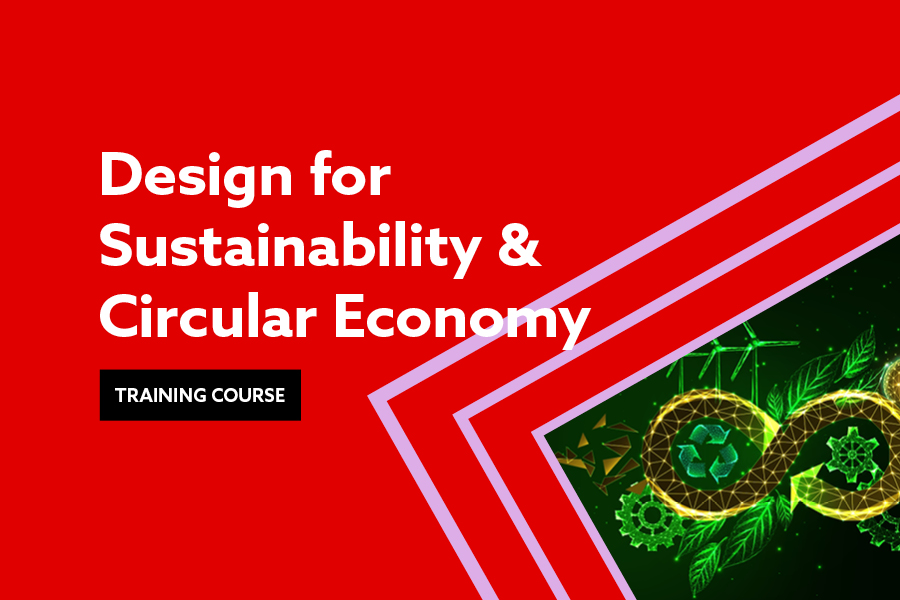Life Cycle Assessment
One-day course providing an insight into the principles of Life Cycle Assessment and how to interpret a report
One-day course introducing the main principles for designing for sustainability and circularity
It is said that 80% of the environmental impact of a product is determined at the design stage. Much of that impact is in materials selection and processing. Generic methodologies for considering sustainability at an early stage in the product life cycle have been developed, and are beginning to be adapted and adopted into real engineering scenarios.
This course will introduce the main principles for designing for sustainability and circularity. It will look at methodologies for introducing those principles into design, with interactive workshops. Some computational tools for sustainable design will be presented. The final session will focus on increasing understanding of end-of-life processes, material scarcity and social impacts.
The course will be delivered over 4 sessions:
Introduction to sustainability principles
The introductory session will discuss what is meant by “sustainability” and how it is interpreted in different contexts. A brief overview of climate change will be given, why it matters and how it relates to materials and manufacturing. Delegates will be given an understanding of circular economy principles, how they are incorporated in design and the product lifecycle. An overview of life cycle assessment will be presented, with comments on emerging methodologies for social impact assessment.
Design for sustainability – putting principles into practice
A design for sustainability (D4S) assessment methodology will be described, with some examples of diverse ways in which designs have been changed to make products more sustainable and related impact factors. Delegates will then be offered some product examples to choose from and work in small groups to identify and prioritise ways in which the design could be made more sustainable. The small groups will feed back to the rest.
Tools for designing for sustainability
The challenge is how to design components and structures that meet the UK government target for net zero carbon emissions.
The session will start with a short re-cap of design processes used in structural applications with reference to transport. Building on the overview of life cycle assessment in session 1, the effect of materials and manufacturing processes on whole life carbon emissions will be presented.
In the concept design phase, the Environmental Analysis Tool (EAT) can be used to compare the emissions of different concepts in addition to the usual technical performance requirements.
There are tools that can be used to reduce material usage such as topology optimisation. The use of statistical design processes (e.g., stochastics) to give robust designs and account for material variability will also be presented.
When considering technical performance, carbon emissions and costs there may be more than one optimum solution and quite often there are conflicting demands. Pareto analysis will be used to trade off these different requirements.
The session will conclude with how to bring different design aspects together to provide overall design direction.
Material circularity, scarcity and social impacts
Using images, video and description, several end-of-life and recycling processes will be described, to establish the importance of a designer knowing what might happen to materials and products at end-of-life (e.g. wind turbine blades, cars, fridges, aircraft, WEEE). The effect of economic factors, business models and regulation will be included. Material scarcity will be considered, and the social and geo-political impacts around material extraction and supply. The course will end with a discussion how delegates can influence the macro-factors to enable more sustainable product development.
This generic course is relevant to anyone with an interest in sustainability and circularity.
The course fee for this one-day programme delivered via Zoom is £615 plus VAT at 20% where applicable. IOM3 members and subscribers to our Business Partner Programme are entitled to a discount of 10% on the course fee.




One-day course providing an insight into the principles of Life Cycle Assessment and how to interpret a report

Consultant & Owner, Grazebrook Innovation
Stella is an advanced materials and sustainability specialist with an engineering background. She is passionate about supporting people to design and innovate with a sustainability mindset, which she does through her consultancy business, Grazebrook Innovation. Stella was Sustainability Specialist on the ATI FlyZero project about hydrogen-powered aviation and previously led sustainability activity and supply chain engagement at Composites UK and worked in composites and smart materials at the Knowledge Transfer Network.

Director, Bac-Cel Ltd
Kevin has founded a number of businesses that have developed new materials and processing techniques for composite materials for a range of applications. Specialities include design and development of lightweight automotive structural components in advanced materials, particularly fibre reinforced plastics, designed to work within today’s ‘multi-material’ car bodies, with a strong focus on next generation all electric and hybrid vehicles.
He has recently started a new business that is developing new natural based materials for sustainable manufacturing and product design for land transport. This includes the use of plant fibre-based composites and the use of innovative design solutions and advanced robotics to reduce materials usage and carbon emissions